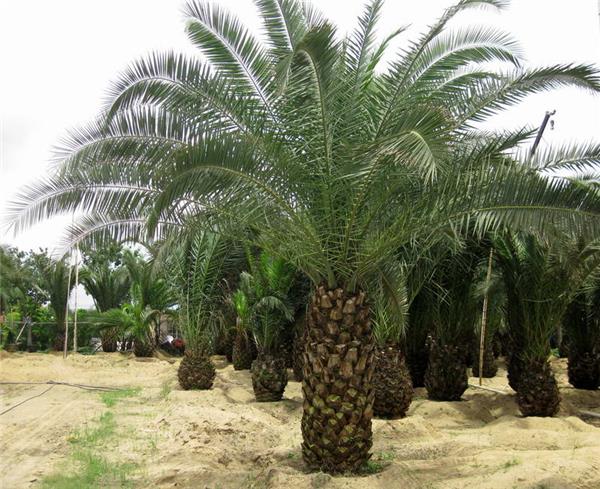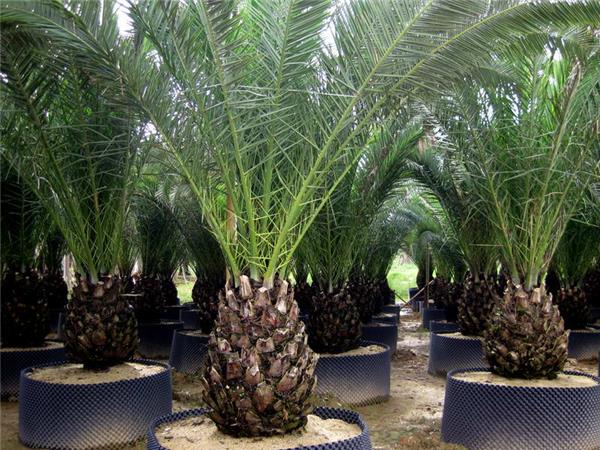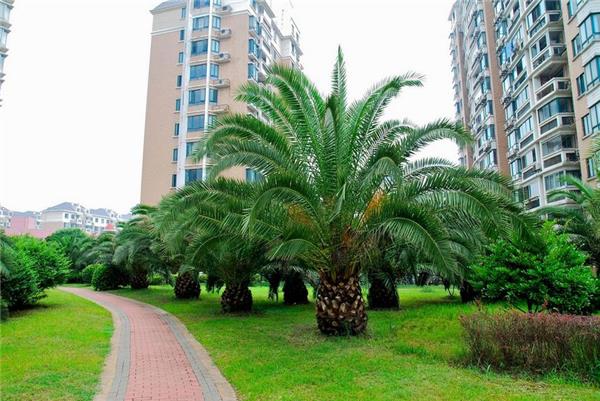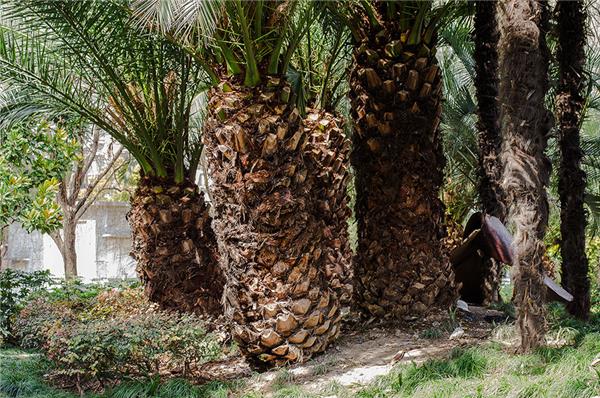A tropical plant, Canary jujube.
The trunk of Canadian jujube is very strong, which makes people look like a very solid feeling. It is a plant that can bring people peace of mind and reliability, so it is also a kind of tree species with high breeding value.

Introduction of Canadian jujube
Morphological features: Canary sea jujube is an evergreen tree, up to 10-15 meters high and 20-30 meters thick. Dry solitary, covered with irregular base of old petiole. The leaves are large, up to 4-6 meters long, curved in a bow, and concentrated at the end of the stem. Pinnately compound leaves, adult leaves have 150-200 pairs of leaflets, narrow and straight, tip-pointed, upper leaflets unevenly opposite, middle leaflets equidistant opposite, lower leaflets every 2-3 clusters, basal leaflets needle-like. Petiole short, base thick, yellowish brown. The leaf sheath at the base of the petiole exists on the dry stem, forming sparse fibrous brown flakes. It blossoms from May to July, and the fleshy inflorescences are drawn from the leaves and are much branched. During the fruit period from August to September, the fruit is ovoid, the apex is slightly protruding, orange-yellow and shiny when mature. Seeds elliptic, central sulcate, grayish brown.
Garden application: Canadian jujube is full of tropical charm, its tree shape is graceful and stretched, the stem breast diameter is often up to 50cm or above, with closely arranged flat rhomboid leaf scars, the leaves are green and vigorous, the pinnae are tough, and the tree shape is semicircular, which is like an umbrella stretched out from a distance, full of tropical amorous feelings, and can be potted for indoor layout or outdoor open field planting, no matter the row planting or cluster planting, all have a good ornamental effect.

Transplanting of small seedlings of Ziziphus jujuba
1. Carefully trim most of the leaves and be willing to re-cut them. If they are not trimmed, most of the leaves will also dry because they cannot keep up with the moisture.
2, carefully tear off the nutrition bag, or not, try not to get rid of the soil on the root of the jujube (the mud on the upper part of the head of the jujube can be removed), the seedling stage will be longer without mud.
3. Put the sapling with mud into the planting hole or flowerpot and cover the fine soil, about 2 centimeters above the head of the jujube. Do not step on it with your feet or press it hard with your hands. The root of the jujube is very fragile and can not afford to be hurt, my friend.
4, immediately irrigate a permeable water, slow seedling stage (before the growth of new leaves) as far as possible shade and moisturizing, but the soil can not accumulate water, do a good job of drainage facilities, otherwise rotten roots, large-scale planting conditions can use sunshade nets, but also often spray water on the leaves, reduce leaf water evaporation, do not rush to fertilize, now fertilization is likely to burn roots.
5. After the seedlings grow new leaves, water them together and apply thin fertilizer frequently. Once a month will be fine. Normal growth of the sunshade net can also be removed.

Pest control methods of canadeli jujube
1. Hanging bag method: Canadian jujube, the tree is tall, so the spraying method is not effective in disease prevention. Great results have been achieved in the prevention and control of coconut leaf beetle by hanging coconut leaf beetle cleaning medicine bag. Hanging medicine bag is mainly due to Rain Water's obscene, constantly release efficacy, unlike spray, washed by Rain Water and washed, losing its efficacy. For example, in the prevention and treatment of heart rot and other harmful diseases, the use of effective agents for light stability and heat stability can also solve the problem of poor control effect of spraying.
2. Anatomical method: for plants that have been seriously decayed by bud rot, and the original agent is difficult to prevent and cure well, the sawing head method can be used to remove the decaying part, let it dry, and then disinfect it with more than 50% carbendazim 600 times. After that, it can be covered with white film, which can not only prevent bacterial infection, but also carry out photosynthesis to promote its early recovery. If the growing point is also rotten, you can give up the treatment and dig it away to prevent the spread of diseases. This method must be used to determine plants that cannot be cured with drugs.

Canadian jujube is a very tropical tree species. If you plant a canary jujube in the courtyard, it will undoubtedly add a lot of tropical scenery to the courtyard and make people feel like being on the tropical seaside every day.
Related
- Wuhan Hospital Iron Tree Blooming Result Was Instantly Frightened by the Gardener Master
- Which variety of camellia is the most fragrant and best? Which one do you like best?
- What is the small blue coat, the breeding methods and matters needing attention of the succulent plant
- Dormancy time and maintenance management of succulent plants during dormancy
- Minas succulent how to raise, Minas succulent plant pictures
- What are the varieties of winter succulent plants
- How to raise succulent plants in twelve rolls? let's take a look at some experience of breeding twelve rolls.
- Attention should be paid to water control for succulent plants during dormant period (winter and summer)
- Watering experience of twelve rolls of succulent plants
- Techniques for fertilizing succulent plants. An article will let you know how to fertilize succulent plants.



